The day the residents resigned still resonates at Medical Center
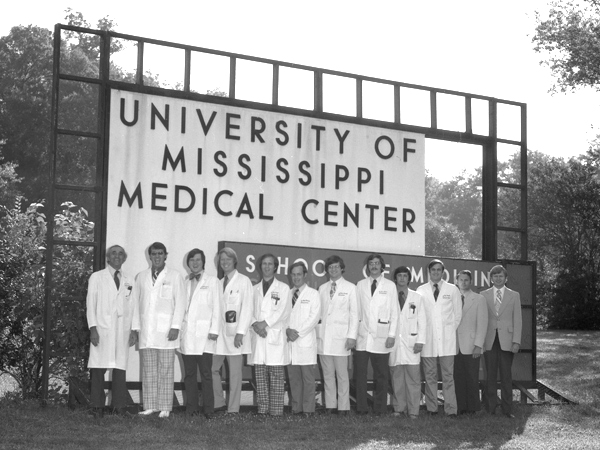
Published in News Stories on April 13, 2015
LETTER OF RESIGNATION TO DR. NORMAN C. NELSON, VICE CHANCELLOR FOR HEALTH AFFAIRS
July 7, 1976
"… for reasons that we are prepared to detail and document we are convinced that the quality of orthopedic education which we seek to attain is not available to us under existing conditions at the University of Mississippi Medical Center, and we are further convinced that the potential to develop an adequate program is not possible so long as Dr. Paul S. Derian remains as director of the program. His lack of guidance, direction and concern for his educational responsibilities have frustrated and hampered our efforts to realize our full professional potential and have caused us to question the integrity of the teaching process.
We, therefore, herewith resign as residents in orthopedic surgery effective this date and respectfully request to be relieved of all obligations and responsibilities to the University of Mississippi Medical Center. Respectfully submitted,
John Patrick Barrett, M.D.
William R. Stewart, M.D.
Byron Thomas Jeffcoat, M.D.
Gene Richard Barrett, M.D.
Walter Rowan Shelton II, M.D.
William Marshall, M.D.
Douglas Wesley Rouse, M.D.
John Kirk Drake, M.D.
David John Gandy, M.D.
(Names added later): Dr. Robert Marascalco, Dr. William Edwards
Nearly 40 years ago a group christened "the Recalcitrant Residents" shaped the course of an entire Medical Center department with one audacious and unprecedented act.
On March 7 of this year, an on-campus reunion brought together all but one of the 11 principal actors, among them: Country Tom, the Kid, Zeus, the Hulk, Little Willie Dynomite and Turkey.
As suggested by their colorful nicknames for each other, they were a tight-knit fraternity; they had to be in order to survive a conflict whose upshot resonates to this day in the Department of Orthopedic Surgery and Rehabilitation - and in the arc of their own lives.
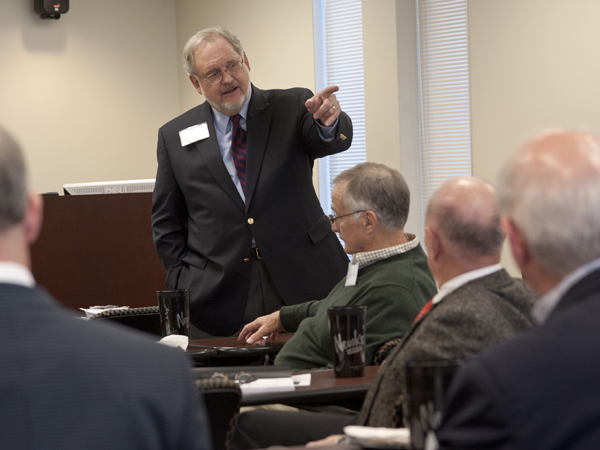
So, on the day of the March reunion, about 50 people met in the Medical Tower for an hour or two of reminiscing about the events of July 7, 1976 - the day every one of UMMC's orthopedic surgery residents quit.
"I felt like a turkey at the time," said Dr. Robert "Turkey" Marascalco during his remarks at the reunion. "Like one that was about to get fried."
In the end, a future governor became involved, all 11 residents left UMMC, their chief departed some months later, and the State College Board named a distinguished successor to lead the withered program: Dr. James L. Hughes Jr., now UMMC professor emeritus of orthopedic surgery, who also addressed the reunion gathering.
"In Vietnam, in the jungle, I was scared," said Hughes, an Army veteran who became the leader of the orthopedic program in the uproar's wake.
"Walking the streets of Moscow, I was scared. Thanks to you guys, I learned terror."
As for the residents, they say they suffered their own days of dread while training under Dr. Paul S. "Mike" Derian, chief of the Division of Orthopedics in the Department of Surgery for 16 years.
Derian, a Navy veteran and college athlete, died on Oct. 31, 2009 in Marion, Va.
"He was a fearless champion of the underprivileged," his obituary reads. "He suffered many criticisms and risks as he promoted racial equality, desegregation, and equal medical care during the tumultuous Civil rights era … . Mike had many friends, few foes, and loved every aspect of living in Marion."
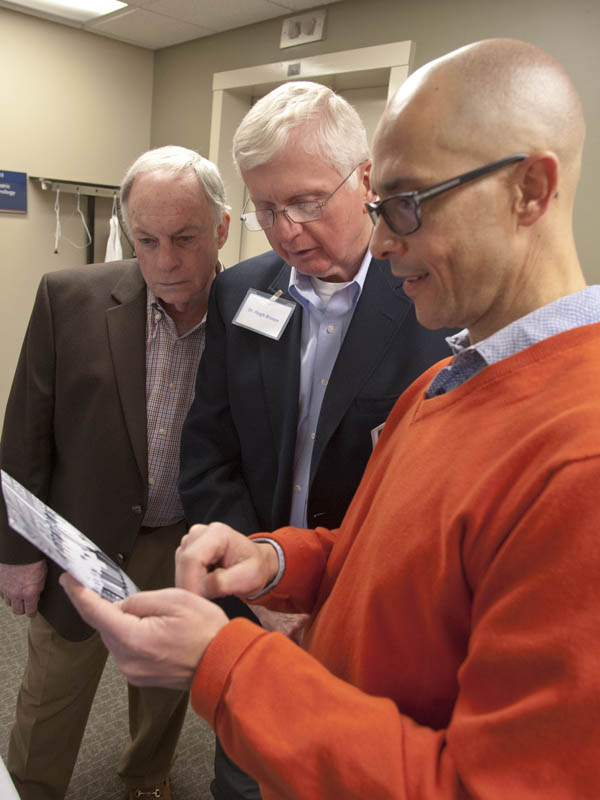
Dr. J. Patrick "Pat" Barrett was not among those friends. Now an orthopedic surgeon at St. Dominic Hospital in Jackson, he was chief resident in his third year under Derian; he was also the leader of the Recalcitrant Residents - a name pinned on them by a reporter and whose ranks included one of his brothers, Dr. Gene Barrett, now a UMMC professor of orthopedic surgery.
In his written account of the uprising, Pat Barrett described his life as a resident during the Derian regime: "(Y)ou were stuck in the muck. It was just sticky mud, it just got you dirty and you could not get out of it. It was horrible. I hated it."
Eventually, UMMC investigated Derian "to determine whether he underreported income he received from treating private patients," as reported by The New Physician in 1976. The Mississippi Medicaid Commission probed allegations of fraud linked to his surgery fees as well.
But the residents' complaints were as much, or more, about Derian's abilities as a teacher and leader. A sampling of their 14 charges: He harassed and humiliated his trainees in the presence of others, including patients; he was unavailable for night and weekend emergencies; he discouraged residents' research interests; he frequently delivered threats of dismissal "over the most trivial incidents."
In Pat Barrett's words: "He never had our orthopedic interests at heart, ever, for any reason."
Derian had his supporters, though. The papers of the late, legendary Dr. James Hardy, chair of surgery at the time, feature pro-Derian testimonials from his former students and patients, as well as from Dr. Robert Currier, chief of the Division of Neurosurgery, and Dr. Robert Sloan, chair of the Department of Radiology.
On Aug. 30, 1976, The Clarion-Ledger ran a letter to the editor from Linda K. Mayfield, whom Derian had treated for a cartilage disease, and who had been assured by Mayo Clinic doctors that, without Derian's surgical skills, "I would in all probability be crippled and in a wheelchair today."
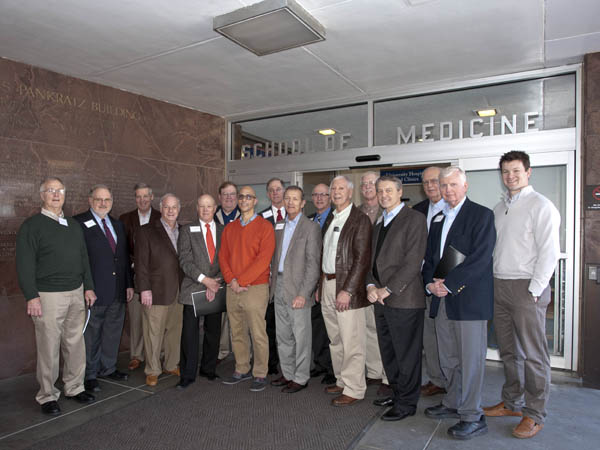
Despite his own dealings with Derian, Pat Barrett attached that letter to his account of the residents' uprising. It was a concession to Derian's competence as a surgeon, if not as an educator.
During the set-to, the official position of the Medical Center's administrators was that they "knew nothing about any problem in the orthopedic department and that the residents did not take their complaints 'through channels,' " The New Physician reported.
This contradicts Hardy's words, as recorded in his autobiography, "The Academic Surgeon." He wrote: "The residents' move abruptly brought to a head a situation which I had long realized was an unhappy one, although I had not known the depth of the problem."
"It was a singular experience," he continued, "it seemed to me, that the orthopedic residents had engaged an attorney (Mr. Winter) without first presenting their complaints to the University Administration."
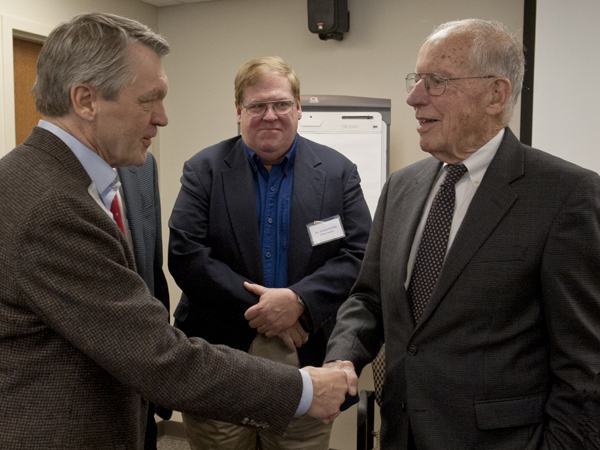
"Mr. Winter" is William Winter, the former lieutenant governor whose recent bid for the governor's office had failed. The fact that the residents thought they needed lawyer reflected their state of mind.
Pat Barrett believed Derian would try to "crush" him. He wasn't alone in that belief.
"Here's 11 guys bucking the system, and we had nobody to support us," recalled another member of the group, Dr. Byron Thomas Jeffcoat, 39 years later. "We were against the establishment. It was a tough thing to make those decisions. But we did it."
Pat Barrett did it first, provoked to revolt after Derian apparently broke a promise to let Dr. Hugh Brown take over the Pediatric Orthopedic Service. It was a position Brown, a pediatric and spine orthopedist, had been seeking for months.
The day after, on June 30, Brown told Pat Barrett that he was resigning. Reflecting on some of Derian's other recent actions, Barrett wrote, "I simply felt like things were going downhill like a runaway train."
Soon, Barrett himself was "on the phone telling 'Turkey' Marascalco that I was quitting." Immediately, the dominoes began to fall. Soon, every resident was on board.
A few days later, a story ran in Sunday's combined edition of The Clarion-Ledger/Jackson Daily News under this headline: "Med Center Residents Resign, List Charges."
Responding to the residents' 14 grievances, Derian's attorney, John Maxey, told the newspaper, "… (I)n my opinion the acts of these gentlemen constitute a malicious and slanderous activity against a physician of wide professional recognition."
Reached for that story by the reporter, Derian did not comment on the charges, and referred all questions to Maxey.
Even today, at least one question remains: Did anyone really win?
The administration stood by Derian, at first. Originally, the residents wanted only to be given credit for all their work and be allowed to leave. Eventually, though, they followed Winter's advice to "shoot a little higher": They pushed for Derian's dismissal.
Dr. Norman C. Nelson refused this condition. The vice chancellor for health affairs and dean of the School of Medicine, Nelson balked at ultimatums and was rankled by the residents' decision to hire an attorney, according to Janis Quinn's "Promises Kept," a history of the Medical Center.
Of "grave concern," however, to Nelson was the claim that "Derian charged for patient care rendered by residents when he was not present," Quinn wrote, although she added "well respected members of the faculty... said they had never seen Derian act inappropriately." Nelson offered to temporarily replace Derian as division chief until he had more facts, but the residents rejected this offer.
At one point, Barrett wrote, the administration did agree to take eight of the 11 residents back. The group declined this deal as well and resigned as one.
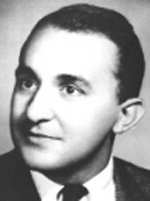
For his part, Derian voluntarily gave up his position as division chief and went on leave for three weeks. The Medical Center allowed him to take a sabbatical from Sept. 1, 1976 until March 1, 1977, before putting him on unpaid leave.
In mid-1977, he said he would resign, but never did. When his contract expired, though, he left for good. It's not clear how -- or whether -- the events of this time figured in his departure.
Apparently, Derian found a happier life in Virginia, where, in his younger years, he had finished college and medical school and served as captain of the University of Virginia baseball team. A year or so after moving back, he married and started a family.
The residents, as well, did not fare too poorly. In July 1976, their cause gained credibility when the Mississippi Orthopedic Society adopted a resolution stating that they had "acted in good faith" and that "their only motive was to improve their orthopedic training program."
Finally, they did receive credit for their work and all found residencies elsewhere. Several would return to Mississippi to practice medicine.
Winter, of course, became governor at last, about three years later. He, too, attended the March reunion, entering the room to a standing ovation from the physicians he had counseled decades earlier and who now presented him a plaque and thank-you messages for his service.
"I graduated from law school 66 years ago," Winter said with a smile, "and this is the first time I've gotten a plaque saying I was a good lawyer."
Winter recalled that he had been jogging on the Chastain Junior High School track one afternoon when Pat Barrett found him and asked for his help. A bond lawyer, Winter told Barrett that this was outside his area.
"But I was so attracted to this problem," Winter said to the reunion gathering, "I became involved; maybe I got too emotionally involved.
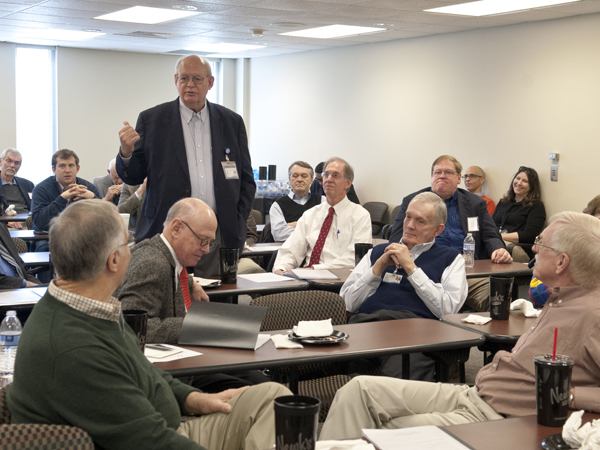
"In terms of my service to you, I didn't help. I might have stirred the pot too much … . It was a disappointment to me… . But I will always be honored to have participated in this.
"The 11 of you had faith in me to try to work out a resolution. The greatest satisfaction was creating friendships I treasure very much."
One of the 11, orthopedic surgeon Dr. Douglas Rouse of Hattiesburg, responded to Winter: "I think the problem was solved, Governor. It just took a few more years than we thought it would."
That seems to be the consensus - that the program, which, by 1987, had grown from a division to a department under Hughes' leadership - got a shot in the arm from the residents' rebellion.
Although he did not attend the reunion, Dr. James Keeton, who recently stepped down as vice chancellor for health affairs and dean of the School of Medicine, sent a statement to be read aloud: "What you have in the department now is the polar opposite of what you had then … . Thank you all for your sacrifice."
In his own remarks, Dr. George Russell, current chair of the department, said, "Your sacrifice enabled a great program. Jim [James Hughes] created a heck of a program … and handed the baton to Bob [Dr. Robert McGuire], who was the consiglieri, the fixer."
Dr. Alan Freeland, professor emeritus and former chief of the medical staff, noted that three years ago the department was the first at UMMC to be recognized in U.S. News & World Report as a top program.
It was Freeland who had asked Pat Barrett to write the history of the department and the infamous rebellion. Summing up his take on that event, Barrett said, "The chief of surgery [Hardy] was one of my heroes and is one of my heroes.
"I have great respect for the dean [Nelson], especially for what he did afterward. The Orthopedic Department became what we always hoped it would be - one of the strongest departments around."
Said his brother, Gene, who joined the Medical Center in 2014 as associate professor of orthopedic surgery, "What we have now is a jewel. All our residents are stars."
Still, for a long time afterward, at least one of the 11 rebels pondered the wisdom of the insurrection.
"It was very trying, very troubling what we did," said Dr. William Marshall, an orthopedic surgeon practicing in Ft. Walton Beach, Fla. "Our careers were on the line. For many, many years I wondered what the ultimate outcome of this was."
Sometime in the mid-1990s, he brought his doubts to the late Dr. Wallace Conerly, who was vice chancellor at the time. "I said, 'Dr. Conerly, after 20 years, did we made the right decision?'" Marshall recalled.
"Dr. Conerly said, 'Yes, you did.'
"That lifted from me the bag of rocks I had been carrying around."


